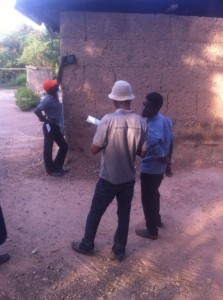This article was originally posted on Triple Pundit on December 30th, 2013 By Justine Porter
Persistent Energy Ghana (PEG) is leading the movement to bring green energy, installing solar-powered micro-grids for the one million Ghanaian households that earn between $1 and $6 a day.
PEG, a Ghanaian energy services company that launched last year, hopes to help under-electrified regions leap-frog directly from kerosene to solar in the same way that Ghana skipped over the installation of telephone lines thanks to the adoption of cell phones. “These are villages that have never had access to power before,” says Hugh Whalan, CEO of PEG. “We are taking these consumers from kerosene and candles all the way to plentiful, clean electricity. It’s exciting. The impact on these communities will be immense.”
Homes in participating villages are wired to a common bank of lithium-ion batteries, which are charged by an array of ground-mounted  photovoltaic panels. Each household on the micro-grid receives a smart meter, which automatically shuts off once the customer runs out of credit. Customers can then add as much or as little credit as they can afford to their account via a local agent with a cell phone.
photovoltaic panels. Each household on the micro-grid receives a smart meter, which automatically shuts off once the customer runs out of credit. Customers can then add as much or as little credit as they can afford to their account via a local agent with a cell phone.
Persistent Energy has funded the installation of several micro-grids in Tanzania. Nate Heller, Chief Operating Officer in Ghana, enjoyed launching Persistent Energy’s first system in West Africa. “We went live in December 2013,” said Heller, who first came to Africa as a member of the Peace Corps and later graduated with an MBA from Yale. “The first installations gave three villages with a minimum of one hundred homes each their own grid.”
While the first three installations are in the Eastern region of the Ghana, PEG plans to expand into the island communities in the Volta Region and then into the Northern Region. Whalan and Heller intend to work with their staff, tweak their model, and then install additional grids in 50 villages, for a total of 5,000 households, by 2014. If all goes well, there’s potential to have 300 Ghanaian villages–a total of 30,000 households–electrified and running on micro-grids by 2015.
Beyond powering lights, PEG’s systems are capable of running radios, charging phones, and powering other basic items. “We even have a few customers in Tanzania with TVs in their homes,” explained Tom George of Persistent’s Finance Department. “In a village where electricity was never available, it’s incredible to power a TV. We’re hoping to do more of that.”
Access to the evening news aside, extra hours of bright light can mean more working hours and higher income. Participating families will be able to charge phones at home, saving hours of travel time into town for a recharge. And unlike kerosene, electric power has significantly lower fire risks. Children who have access to light after sundown typically score better in school, not only because they have more hours to do homework and better quality light, but because they avoid the negative health impacts of smoke inhalation on young lungs.
“The demand is there,” said George Yeboah, Customer Experience Manager for PEG. “There are hundreds of millions of people across Africa who don’t have energy, want it, and are willing to pay for it. They pay a ton for kerosene and they want an alternative. This is a huge market opportunity for Persistent Energy.” The cost of belonging to a micro-grid is comparable to that of buying kerosene or batteries. The average Ghanaian household pays between $6 and $17 a month for electricity, a cost which is on the rise. The average household that connects to the micro-grid will pay as little as forty cents per day for energy that is far cleaner and much more reliable.
“This system takes the pressure of borrowing a huge amount of money off the individual,” explained Heller. “Because the cost of the system is spread out over one hundred or more homes over the course of two years, the cost is less intimidating and more manageable.”
“The market is primed for growth” Yeboah summarized. “Right now there are a few other companies doing this kind of work in Africa, but in five years, there will be hundreds. We hope to execute quickly enough that we become the leader in the West Africa, but whether or not that’s the case, in ten years when companies like ours are commonplace, we’ll be able to say that we helped pioneer the business model that brought light to people who needed it.”
“The road to achieve what we aim to will be tough,’ says Heller, ‘but we are looking forward to these challenges. We’re pumped’.
Justine Porter
Currently works as the Hiring Manager for Della, a social-enterprise in the Volta Region of Ghana that creates sustainable employment and educational opportunities for women through fair-trade fashion. Prior to that, she worked as the Operations and Programs Manager of Della’s Ghana production center. Previous professional experience includes implementing neighborhood revitalization programs as the Volunteer and Outreach Coordinator at Habitat for Humanity of Dutchess County. She spent time teaching English on Réunion Island in Indian Ocean and worked as the Grassroots Coordinator for Falling Whistles, a social-justice campaign dedicated to empowering war-affected women and children in the Democratic Republic of the Congo. Justine received a B.A. in International Relations and French Language from the State University of New York at Geneseo. Her primary interest in sustainable business is in its application to social entrepreneurship and development projects among underprivileged communities in Sub-Saharan Africa.